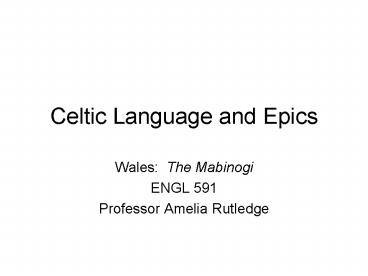Celtic Language and Epics
1 / 10
Title:
Celtic Language and Epics
Description:
Mortal aid to fairy-folk (usually related to feuds and border disputes) ... The Fairy Bride/Otherworld Spouse. The Calumniated Wife. Child of prodigious growth ... –
Number of Views:228
Avg rating:3.0/5.0
Title: Celtic Language and Epics
1
Celtic Language and Epics
- Wales The Mabinogi
- ENGL 591
- Professor Amelia Rutledge
2
Territory of Celtic Migrations(Countries and
Local Place Names)
3
The Celts A Distinct Culture by 1000 BCE
600-400 BCE Western migrations 390 BCE
Attack Rome (bought off) 279 BCE Attack Delphi
(spoils removed to France) 202-190 BCE
Suppressed (incorporated into the Roman Empire
after the Punic Wars) 55-54 BCE Gaul conquered
by Julius Caesar (surviving Celtic religious
leaders and teachers disperse westward)
4
Language and Literature in England
5
Important Persons of the Tuatha Dé
Lugh (called Lamfhada or "Long-Armed" and
"Samildanach" or "Many-Skilled"). Welsh
Lluch Nuada (military leader and swordsman) The
Dagda (the "Good God," similar to Lug in his
multiple skills, but also associated with
fertility and excess) Lír (and his son
Mannanánboth sea godswaves are called the
horses of Lír). Welsh Llyr and
Manawyddan Goibniu (the smith, assisted by
Luchta and Creidhne). Welsh Gofannon Dian
Cécht (a smith, and with his son, Miach, a
physician) Badb/Morrígan/Macha/Nemain ( aspects
of the warrior goddess each may sometimes have
three aspects)
6
The Mabinogi Motifs Mortal aid to fairy-folk
(usually related to feuds and border
disputes) Birth portents/strange births Hostile
parent (often mother) Magical cauldrons Preterna
tural survival, e.g., Bran's head The
"congenital" animal (often a colt) The Rash
Boon Otherworld Crossings/ Otherworld
enemies One-year delay The Fairy
Bride/Otherworld Spouse The Calumniated
Wife Child of prodigious growth/development
7
The Mabinogi Patterns
8
Blodeuedd to Bodeuwedd
9
Myth in the Novel
- In Mythology in the Modern Novel, John White
suggests these possibilities for the use of myth - The complete narration of a classical myth (in
implied classical, "imaginary," or modern times). - The juxtaposition of sections narrating a myth
with others concerned with the contemporary
world. - A novel, set in the modern world, which contains
a pattern of references to mythology. - A novel in which a mythological motif prefigures
a part of the narrative (an event, a character, a
group) but without running consistently through
the narrative. - A "newly-created" myth.
10
Additional Resources
- Celtic Mythology in Fantastic Fiction
- Celtic Mythology and Myth History (includes some
details about Irish mythology and epic)































